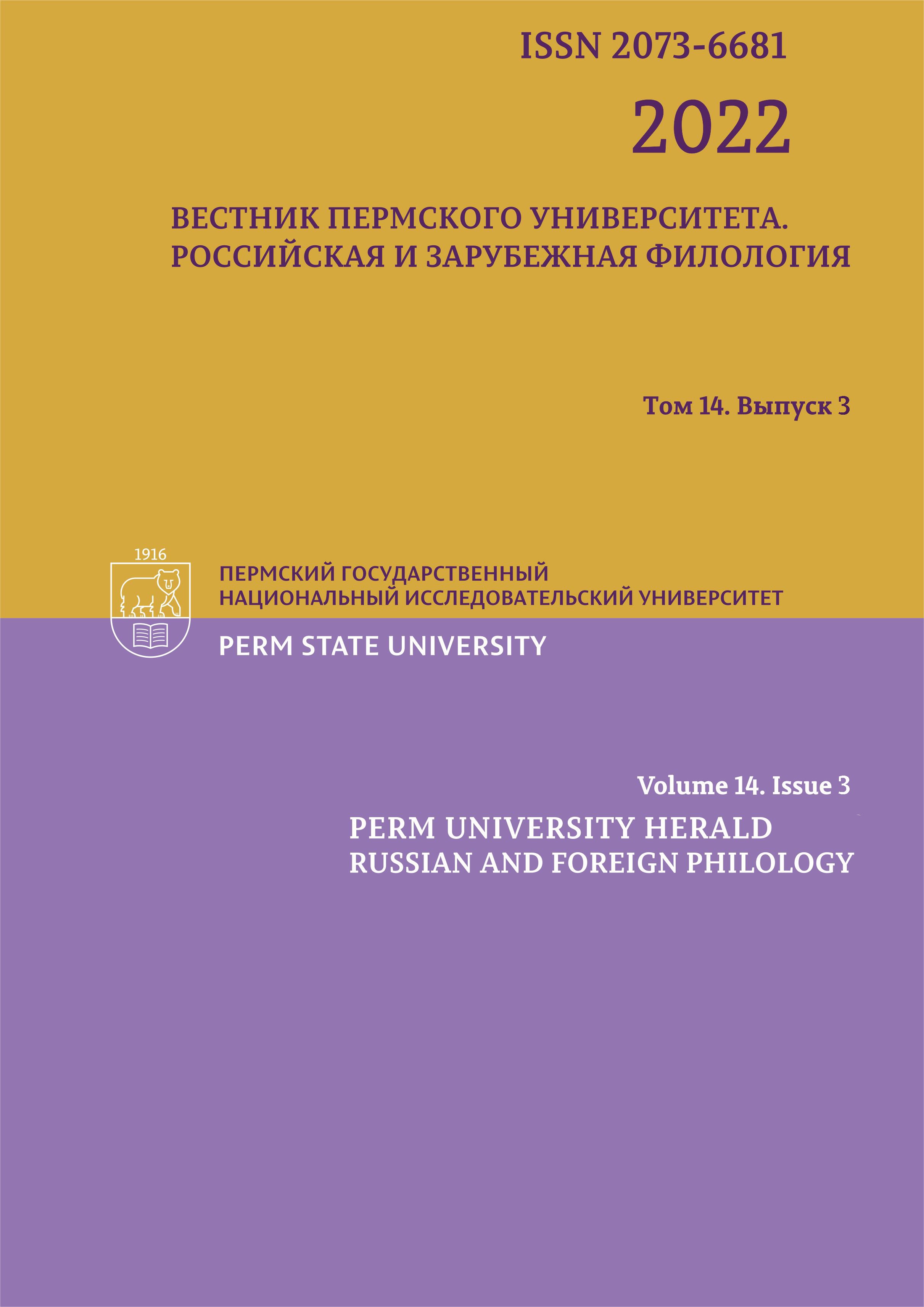Zen Buddhist Motifs in A. Makushinsky’s novel ‘The Stopped World’
DOI:
https://doi.org/10.17072/2073-6681-2022-3-78-86Keywords:
Zen; Buddhism; emptiness; illusory; oneiric reality; meditation.Abstract
The article aims to comprehend the impact of Zen Buddhism, its philosophical positions and practices on the problems and poetics of the novel by A. Makushinsky The Stopped World. The Buddhist influence in the novel is manifested in the literary implementation of the principles of the emptiness of reality, the illusory nature of the human ‘I’, the relativity of time and space, and also in the features of the created characters, landscapes and interiors, in the organization of the chronotope. Based on the results of the study, it can be stated that in The Stopped World A. Makushinsky not only depicts the world perceived in meditation by means of a thorough and detailed analysis of all components of reality but also literally depicts the world from meditation. The writer draws attention to the principle of universal connections of things showing the similarities of various characters in the novel. The Stopped World is looking for parallels that would most adequately explain what Zen and human consciousness are. Such parallels are sky and water, photography, architecture. Each of them expresses the dynamics that have become static, the fuss that has become peace, or the ‘stopped world’. The theoretical and methodological base of the work rests on the research conducted by V. Toporov (on the ‘Petersburg text’) and P. Alexeev (on the ‘Muslim text’): the precedent translation of the structural-semiotic approach from the urban-cultural into the religious sphere allows us to apply it also to the literary study of the presence of Buddhist ideas and motifs in the text. The relevance of the article is determined by the low level of knowledge of the presence of Buddhism in Russian literature as one of the world religions and one of the traditional religions of Russia. The article is novel in that it attempts to provide a consistent and broad study of the ‘Buddhist text’ of modern Russian literature based on thenovel The Stopped World by A. Makushinsky taking into account the writer’s poetic work.References
Иванченко А. Л. Монограмма. М.: АСТ: СПб.: Астрель-СПб, 2005. 379 с.
Иванченко А. Л. «Homo Mysticus». Сутры солнечного удара. Темные аллеи // Топос: сайт лит.-филос. жур. URL: https://www.topos.ru/article/3003 (дата обращения: 14.03.2022).
Кинуё М. Художественное воплощение категорий философии дзэн в «Стихотворениях в прозе» И. С. Тургенева // Филологические науки. 2001. № 5. С. 13–20.
Макушинский А. А. Остановленный мир. М.: Изд-во «Э», 2018. 800 с.
Мандельштам О. Э. Собрание сочинений: в 2 т. М.: Худ. лит., 1990. Т. 2. 623 с.
Мандельштам О. Э. Собрание сочинений: в 4 т. М.: Арт-Бизнес-Центр, 1993. Т. 1. 370 с.
Мачерет Э. О некоторых источниках «буддийской Москвы» Осипа Мандельштама // Acta Slavica Iaponica. 2007. T. 24. P. 166–187.
Радов Е. Жажда света // Газета Утро.Ру. URL: https://utro.ru/articles/2007/12/26/704776.shtml (дата обращения: 14.03.2022).
Самойлова Г. М. Русская литература и дзэн-буддизм // Вестник Курганского государственного университета. Серия: «Гуманитарные науки». 2007. Вып. 3, № 2(10). С. 93–96.
Судзуки Д. Т. Введение в дзэн-буддизм. URL: http://psylib.org.ua/books/sudzd01/txt33.htm (дата обращения: 14.03.2022).
Судзуки С. Сознание дзэн, сознание начинающего / пер. с англ. Г. Богданова, Е. Кирко, Э. Семенова. 2-е. изд. М.: Сиринъ садхана, 2000. 232 с.
Толстой Л. Н. Анна Каренина. М.: Наука, 1970. 911 с.
Толстой Л. Н. Одумайтесь!: Ст. по поводу Русско-японской войны. Christchurch, Hants: «Свободное слов» A. Tchertkoff, 1904. 64 с.
Толстой Л. Н. Переписка с русскими писателями: в 2 т. / сост., вступ. статья и примеч. С. А. Розановой. 2-е изд., доп. М.: Худ. лит., 1978. Т. 2. 479 с.
Тютчев Ф. И. Сочинения: в 2 т. М.: Правда, 1980. Т. 1. 384 с.
References
Ivanchenko A. L. Monogramma [Monogram]. Moscow, AST Publ., St. Petersburg, Astrel’-SPb Publ., 2005. 379 p. (In Russ.)
Ivanchenko A. L. ʽHomo Mysticusʼ. Sutry solnechnogo udara. Temnye allei [ʽHomo Mysticusʼ. The Sunstroke sutras. Dark alleys]. Topos: website of the literary and philosophical journal. Available at: https://www.topos.ru/article/3003 (accessed 14 Mar 2022). (In Russ.)
Kinuyo M. Khudozhestvennoe voploshchenie kategoriy filosofii dzen v ʽStikhotvoreniyakh v prozeʼ I. S. Turgeneva [The artistic embodiment of the categories of Zen philosophy in ʽPoems in Proseʼ by I. S. Turgenev]. Filologicheskie nauki [Philology. Theory & Practice], 2001, issue 5, pp. 13–20. (In Russ.)
Makushinskiy A. A. Ostanovlennyy mir [Stopped World]. Moscow, ʽEʼ Publ., 2018. 800 p. (In Russ.)
Mandelstam O. E. Sobranie sochineniy: v 2 t. [Collected Works in 2 vols.]. Moscow, Khudozhestvennaya literatura Publ., 1990, vol. 2. 623 p. (In Russ.)
Mandelstam O. E. Sobranie sochineniy: v 4 t. [Collected Works in 4 vols.]. Moscow, Art-Biznes-Tsentr Publ., 1993, vol. 1. 370 p. (In Russ.)
Macheret E. O nekotorykh istochnikakh ʽbuddiyskoy Moskvyʼ Osipa Mandel’shtama [On some sources of Osip Mandelstam’s ʽBuddhist Moscowʼ]. Acta Slavica Iaponica, 2007, vol. 24, pp. 166–187. (In Russ.)
Radov E. Zhazhda sveta [Thirst for Light]. Newspaper Utro.Ru. Available at: https://utro.ru/articles/2007/12/26/704776.shtml (accessed 14 Mar 2022). (In Russ.)
Samoylova G. M. Russkaya literatura i dzen-buddizm [Russian literature and Zen Buddhism]. Vestnik Kurganskogo gosudarstvennogo universiteta. Seriya: ‘Gumanitarnye naukiʼ [Bulletin of Kurgan State University. Series: ʽHumanitiesʼ], 2007, issue 3, no. 2(10), pp. 93–96. (In Russ.)
Suzuki D. T. Vvedenie v dzen-buddizm [An Introduction to Zen Buddhism]. Available at: http://psylib.org.ua/books/sudzd01/txt33.htm (accessed 14 Mar 2022). (In Russ.)
Suzuki S. Soznanie dzen, soznanie nachinayushchego [Zen Mind, Beginner’s Mind]. Transl. from English by G. Bogdanov, E. Kirko, E. Semenov. 2nd ed. Moscow, Sirin” sadkhana Publ., 2000. 232 p. (In Russ.)
Tolstoy L. N. Anna Karenina. Moscow, Nauka Publ., 1970. 911 p. (In Russ.)
Tolstoy L. N. Odumaytes’!: Stat’ya po povodu Russko-yaponskoy voyny [Bethink Yourselves. Tolstoy’s Letter on the Russo-Japanese War]. Christchurch, Hants, ʽSvobodnoe slovoʼ A. Tchertkoff Publ., 1904. 64 p. (In Russ.)
Tolstoy L. N. Perepiska s russkimi pisatelyami [Correspondence with Russian Writers: In 2 Vols.]. Comp., introd. article and comment. by S. A. Rozanova]. 2nd enlarged ed. Moscow, Khudozhestvennaya literatura Publ., 1978, vol 2. 479 p. (In Russ.)
Tyutchev F. I. Sochineniya v 2 t. [Essays in 2 vols.]. Moscow, Pravda Publ., 1980, vol. 1. 384 p. (In Russ.)




